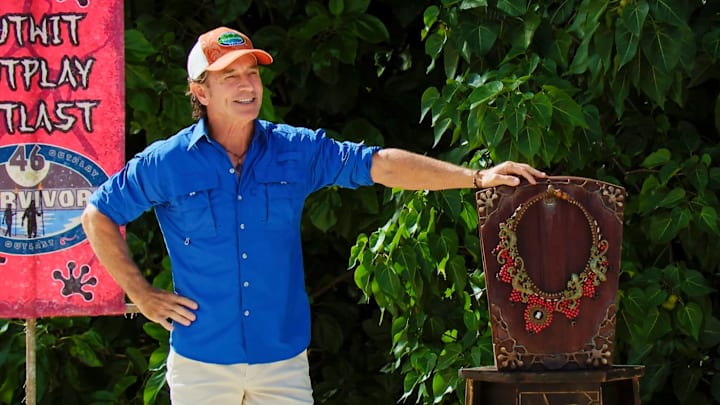Survivor has been a TV staple since 2000 and there's been a lot of buzz around its 50 season milestone which won't air until 2026. But the show's host, executive producer, and showrunner Jeff Probst isn't just concentrated on that achievement. His vision stretches beyond it to the seasons that will come after. And he does mean seasons.
In an interview with Variety, Probst opened up about where he sees the future of the show:
"When you’re in an executive producer position, you have to have a global look at the show. I can’t just be worried about this season. I have to go, ‘How are we going to get to 50?’ And then, ‘What’s 51? How do we get to 60?’ So, I’m always taking a big picture view."
60 is a surprising number, particularly in this era of broadcast television but Survivor has been a consistent winner for CBS. The human element of the show plays a large factor in this. While the format has changed in some aspects of the survivalist competition's 24 year run, with the introduction and removal of challenges and gameplay shifts, the contestants have always been the unpredictable magic in Survivor's successful recipe.
Probst' behind-the-scenes work is undeniable as well. His mind is always turning over what they can tackle from season to season, sharing that he already has a file for season 51 with "scribbles" of what they could possibly do. Though that's not to say that every idea over the years has been a good one or that it was executed well. But, at the end of the day, there are two things of import when it comes to this series: the "dangerous fun" of the competition that pushes contestants to figure out how to navigate this incredibly difficult, taxing, and often rewarding journey and the people themselves.
Survivor is about the gameplay but there is a narrative baked into the series, too. Probst prizes the three-dimensional, compelling stories depicted on the show through the people they cast. He touched on this while speaking about the mandate handed down by CBS president and CEO George Cheeks which required that 50% of the cast be people of color.
"[I]t forced us to dig deeper in our process of casting and the riches are on display in every new season of ‘Survivor.' It’s been a really great teacher to me about the phrase ‘representation matters,’ because now you do have people applying who, when we meet them, say, ‘I applied because I saw a young woman who looked like me, who sounded like me, who was where I was from, and I realized that she can do it, maybe I can do it.’"
Representation matters has been a clarion call for decades in the industry with more and more people of diverse walks of life being seen on television, opening viewers up to modes of thinking, cultural upbringing, and living that we may or may not be familiar with. That's not only benefited how we tell stories but also increased whose stories get told.
But Survivor doesn't just have inclusive casting. Mental health is a priority as well. Contestants have access to a psychology team during the casting process, while on the show, and after, too. There's a full binder of resources at their disposal for their post-show treatment which includes a list of psychologists with differing specialties.
Probst mentioned that there are still contestants from early seasons who utilize these resources for their medical and psychological needs. When he and the team behind the show say they're here for them mean it and have seen contestants through to the end of their needed care.
With such an attention to what makes Survivor work as a whole, it's no wonder Probst doesn't see an end to the series. It has a winning format, with a devoted fanbase, and it's understood that this is a people first program. It wouldn't be surprising if it did continue on into the 2030s if it remains managed in the thoughtful way that has been.
Stay tuned to Hidden Remote for more news and coverage!
